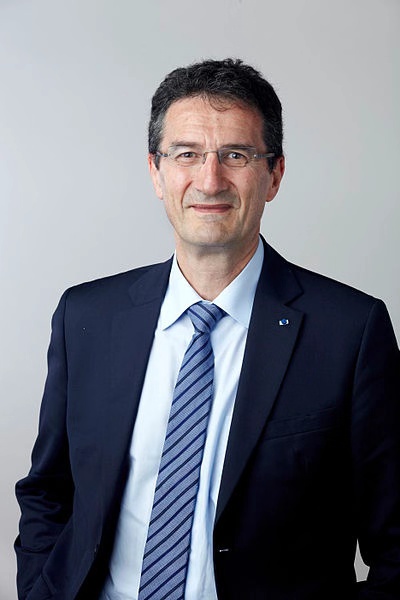
Philippe J SansonettiM.D.
- Academic title:Principal Investigator
- Discipline:Microbiology
- Departments:Microbial Molecular Pathogenesis and Symbiosis
- Phone:
- E-mail:philippe.sansonetti@siii.cas.cn
- Mailing Address:Life Science Research Building, 320 Yueyang Road, Xuhui District, Shanghai 200031, P.R. China
|
2019-present
2019 - 2021 2008 - |
Pricipal Investigator,Chief Scientist ofThe Center for Microbes in Development and Health, Shanghai Institute of Immunity and Infection, CAS Emeritus Professor, Institut Pasteur Professeur titulaire, Chaire de Microbiologie et Maladies Infectieuses, Collège de France |
|
2005 - 2019 |
Director of INSERM UNIT 786 (2005-2013) and 1202 (2013-2019) |
|
2000 - 2019 |
Professor of exceptional class, Institut Pasteur |
|
1995 - 2000 |
Medical Director, Institut Pasteur, Paris, France |
|
1994 - 2000 |
Professor, Institut Pasteur |
|
1989 - |
Head of Unité de Pathogénie Microbienne Moléculaire,Institut Pasteur, Paris, France |
|
1985 - 1995 |
Head, Out-patient Clinic, Institut Pasteur Hospital,Paris, France |
|
1983 - 1987 |
Researcher at the Institut Pasteur at the Institut Pasteur Hospital, Paris, France |
|
1981 - 1985 |
Head of Clinic-Assistant, Institut Pasteur Hospital, Paris, France |
1979 – 1981 Postdoctoral Fellow Walter Reed Army Institute of Research, Washington DC, USA
1979 Internal Medicine, Faculty of Medicine, Paris, France
1976 MS, Biochemistry/Microbiology, Faculté des Sciences, Paris 7, France
Medicine, particularly infectiology, has been my constant source of inspiration and stimulation in research. It is an endless resource of questions and challenges. I have made basic discoveries that have forged the multidisciplinary field of microbial pathogenesis, while also developing translational research programs largely aimed at improving health of children in the most impoverished areas of the planet, well in line with the pasteurian tradition. My research is focused on:
1) Basic research on Shigella pathogenesis
2) Shigella vaccine development
3) Gut microbiome, from homeostasis to disease
4) Translational research
1) Basic research on Shigella pathogenesis
I am among those who pioneered molecular pathogenesis of infections, using the invasive enteric pathogen Shigella that I established as a model. I have contributed detailed understanding of the molecular mechanisms of Shigella pathogenesis. We eventually provided a unique integrative view of infection, in vitro and in vivo, leading to better understanding how the host senses the bacterial danger and how the pathogen uses and subverts innate immune responses to respectively disrupt the epithelial barrier and survive humoral and cellular immune effectors. This succession of original discoveries set the basis of a novel model of interdisciplinary study of infections, also known as “cellular microbiology”. Our recent successive discoveries represent a true “second breath’ of Shigella research and are of more global value in the study of bacterial pathogenesis.
2) Shigella vaccine development
I was the first to develop a vaccine against shigellosis by rational genetic attenuation of virulence based upon the knowledge our group had accumulated on the genetic bases of cell and tissue invasion. These candidate vaccines have successfully gone through phase 1 and 2 clinical trials in USA, UK and France. In 2009, I was successful in being awarded the coordination of a major European-Union funded grant (12 million Euros) - STOPENTERICS - to hasten the conception and clinical development of a novel generation of vaccines against Enterotoxigenic Escherichia coli (ETEC) and Shigella, the two major causes of severe enteric infections in the developing world. Following this program, a novel prototype of conjugate vaccine in which the somatic/serotype specific O- polysaccharides are chemically synthesized has now provided evidence of excellent tolerance and strong immunogenicity in a phase 1 trial. Thanks to a large scale grant of the Bill and Melinda Gates Fundation, the program will now move to phases 2/3 in sub-saharan Africa.
3) Gut microbiome, from homeostasis to disease
In the past 10 years, thanks to the support of the Howard Hughes Medical Institute and the successive award of two prestigious European Council (ERC) Advanced grants respectively called HOMEOEPITH and DECRYPT, I started to tackle the field of bacterial symbiosis, with the aim of switching it from descriptive metagenomics to a true mechanistic “cellular microbiology of symbiosis”, capitalizing on our work on pathogens to identify the molecular cross-talks achieving symbiotic/mutualistic interactions between the gut mucosa and the microbiome - “from metagenomics to experimentomics” - particularly how bacteria of the gut microbiome regulate epithelial homeostasis.
4) Translational research
On these basis, in addition to our vaccine programs, we develop several translational projects such as: a discovery program of molecules stimulating the expression of epithelial antimicrobial peptides; a parallel clinical study on gut bacterial translocation in leukemic patients in bone marrow aplasia following chemotherapy and how it relates to the bactericidal role of antimicrobial peptides.We have also initiated an ambitious study of the pathogenesis of Pediatric Environmental Enteropathy (PEE) in sub-Saharans Africa (Central African Republic and Madagascar). Our study –MICROBIOTA – is largely aimed at identifying the composition of this dysbiosis and, in this basis, disentangle the pathogenesis of PEE and offer biomarkers for early detection, as well as preventive and therapeutic solutions to eliminate stunting and psychomotor retardation that are the dominant consequences of PEE.
In Summary, I have made basic discoveries that have forged the multidisciplinary field of microbial pathogenesis, while also developing translational research programs largely aimed at improving health of children in the most impoverished areas of the planet, well in line with the pasteurian tradition. My work has been recognized by numerous awards and I am an elected member of national and international organisations, including EMBO, the French Academy of Sciences, The Royal Society and the US National Academy of Sciences.

